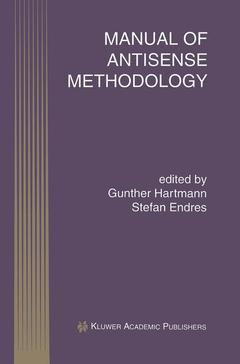Description
Manual of Antisense Methodology, 1999
Perspectives in Antisense Science Series, Vol. 4
Coordinators: Hartmann Gunther, Endres Stefan
Language: English
Subject for Manual of Antisense Methodology:
Keywords
Nucleotide; cell culture; chemistry; delivery; drugs; immunology; pharmacology; receptor; reproduction; synthesis
Publication date: 10-2012
205 p. · 15.5x23.5 cm · Paperback
205 p. · 15.5x23.5 cm · Paperback
Description
/li>Contents
/li>Biography
/li>
In the past few years, antisense methodology has moved from in vitro studies to in vivo studies and first human trials. While the basic concept of antisense technology is simple, the methodological problems associated with its use are numerous and complex. Antisense- based methods have proven to be a field of research where careful attention to experimental protocols and appropriate controls is necessary.
The Manual of Antisense Methodology emphasizes the application of antisense oligonucleotides, and is a guide for the identification of antisense and non-antisense effects in different experimental settings. The work is organized into three sections: antisense application in vitro, antisense application in vivo (animal models) and finally, clinical antisense studies. Where at all possible, the methods are described in sufficient detail to allow reproduction of a given experiment.
The Manual of Antisense Methodology will be of interest to researchers in immunology, cancer research, pharmacology and internal medicine; and physicians conducting clinical studies in these fields.
The Manual of Antisense Methodology emphasizes the application of antisense oligonucleotides, and is a guide for the identification of antisense and non-antisense effects in different experimental settings. The work is organized into three sections: antisense application in vitro, antisense application in vivo (animal models) and finally, clinical antisense studies. Where at all possible, the methods are described in sufficient detail to allow reproduction of a given experiment.
The Manual of Antisense Methodology will be of interest to researchers in immunology, cancer research, pharmacology and internal medicine; and physicians conducting clinical studies in these fields.
I: The chemistry of antisense oligonucleotides.- 1. Chemical synthesis and purification of phosphorothioate antisense oligonucleotides.- 2. How to choose optimal antisense targets in an mRNA.- II: Antisense application in vitro.- 3. How to characterize and improve oligonucleotide uptake into leukocytes.- 4. Strategies for targeted uptake of antisense oligonucleotides in hepatocytes.- 5. How to exclude immunostimmulatory and other nonantisense effects of antisense oligonucleotides.- 6. Testing antisense oligonucleotides in controlled cell culture assays.- 7. Inhibition of TNF synthesis by antisense oligonucleotides.- 8. Inhibition of IGF-1 receptor expression by antisense oligonucleotides in vitro and in vivo.- III: Antisense application in vivo.- 9. How to test antisense oligonucleotides in animals.- 10. Lipid-based carriers for the systemic delivery of antisense drugs.- 11. Designing a clinical antisense study.
Gunther Hartmann, M.D. is a clinical and research fellow at the Division of Clinical Pharmacology, University of Munich. Stefan Endres, M.D. is an internist with subspecialties in gastroenterology and intensive care medicine. He is Chief of the Division of Clinical Pharmacology of the medical faculty at the University of Munich.
© 2024 LAVOISIER S.A.S.




